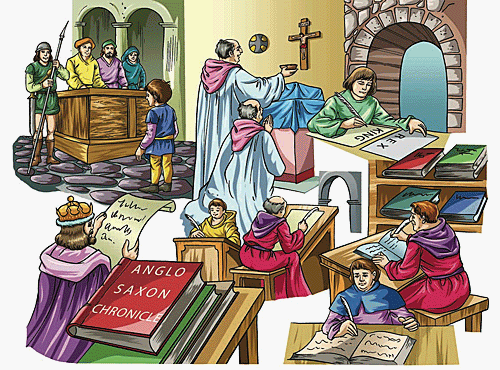English and Its Historical Development, Part 14
(Alfred the Great, the first king of England)
In A.D. 871-899, Alfred the Great served as the first king of England and he was responsible for the revival of law, religion, and learning

The impact of the Viking onslaught on literature and learning was disastrous; however, it was Alfred who restored ruined monasteries and churches, established new ones, and did much to promote learning in English for England
By the time Alfred came to the throne, most of the great monasteries of Northumbria and Mercia lay in ruins, and with their destruction the intellectual fervor that had placed England in the forefront of European scholarship had swiftly disappeared.
Despite constant crises and his preoccupation with military operations and affairs of state necessary to the preservation of his beleaguered kingdom, Alfred somehow found time to foster the revival of learning, law, and religion.
He restored ruined monasteries and churches and established new ones, and in an effort to promote a desire for education among his people he strove to provide them with books in the English vernacular.
It was Alfred's conviction that the cause of education could be served best by utilizing English rather than Latin as the basic medium of communication, both in schools and in books for adults.
In order to achieve his utilization of English, he set about learning Latin and proceeded to translate the most important books of his age into English, adding prefaces and interpolated comments.
Among the great books of the ninth century which he either translated or commissioned for translation from Latin into English was Bede's Ecclesiastical History of the English People, because he believed strongly that his people should know something of their past.
King Alfred's greatest contribution to the development of English prose was his creation in 891 of the Anglo-Saxon Chronicle, which recounted the history of England from the time of Caesar's invasion in 55 B.C. until its termination in A.D. 1154.
King Alfred is credited with the saving of England from complete occupation and destruction by the Vikings
The fact that the Danes did not conquer all of England and destroy the young and vulnerable roots of Christian society and culture was due in huge measure to the dauntless courage, skilled diplomacy, and wisdom of King Alfred, who, alone of English monarchs, has been honored by history with the title of "The Great".
Even the greatness of this greatest of English kings threatened to prove insufficient to withstand the repeated thrusts of the Northmen.
After seven years of resistance, in which temporary victories were invariably succeeded by fresh defeats, Alfred was forced to take refuge with a small band of personal followers in the marshes of Somerset.
In this darkest time for the fortunes of the English Alfred's courage and persistence triumphed; however, Alfred was forced to yield more than half of England to the district called the Danelaw; the territory where Danish sovereignty and law was dominant.
Proceed to Part 15, Danelaw territory.
INDEX or Table of Contents, English and its historical development.
References: sources of information.
